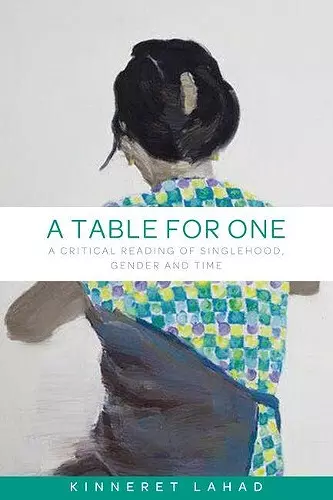A Table for One
A Critical Reading of Singlehood, Gender and Time
Format:Hardback
Publisher:Manchester University Press
Published:11th Aug '17
Should be back in stock very soon

"What are you waiting for?" Stop wasting your time" "You will die alone," "You will miss the train and stay on your own!" These are some of the questions and warnings that single women hear on an everyday basis. Single women are constantly being asked whether they are ''still single,'' or being bid to get married next or soon. Still, soon, ever-after, waste of time, waiting, how long, when, all these form part of the rich language of time.
This book argues that time plays a crucial rule in the discursive formation of female singlehood and that our common understanding of singlehood is dominated by underlying temporal models, premises and concepts. By adopting an interdisciplinary approach and integrating different theoretical realms and perspectives, this book paves way for a new theorization of singlehood and time. Lahad's unique approach gives us the opportunity to explore and theorize singlehood through temporal concepts such as waiting, wasting time, timeout and accelerated aging. Other temporal categories which are examined throughout this book as age, the life course, linearity and commodification of time enable the fresh consideration of our dominant perceptions about collective clocks, schedules, time tables and the temporal organization of social life in general. By proposing this new analytical direction, this book seeks to rework some of our common conceptions of singlehood, and presents a new theoretical arsenal with which the temporal paradigms which devalue and marginalize single women and women's subjectivies in general can be understated.
Lahad argues that singlehood is sociologically important, because it touches upon some of the pressing issues in social life and raises fundamental questions about how people make sense of their lives and organize their lives with others. Drawing on a wide range of cultural resources - including web columns, blogs, advice columns, popular clichés, advertisements and references from television and cinema, the author challenges the meaning-making processes of singlehood and time. In this connection, the book lays the ground for a rich, multilayered politicized analysis of solo living and temporality and intends to be a mile stone in both singlehood and time studies.
Kinneret Lahad has provided a fascinating discussion on gender, singlehood, and social time. Challenged by temporal metaphors such as "biological clock" or "missing the train", single , urban, upper and middle class women have been portrayed as outliers of heteronormative social norms, where being married is equalled to being "normal." Using discourses from popular culture, everyday talk, and new media technologies in the Israeli context, Lahad dissects and challenges the long standing linear life course studies in sociology with a fresh, interesting and innovative perspective on the feminist reading of singlehood. It is a ground-breaking work on the sociology of gender and the sociology of time.
Gökce Yurdakul, Humboldt University, co-author of The Headscarf Debates: Conflicts of National Belonging
From the outset, the reader is drawn into a highly readable and theoretically engaging study of "long-term" single women. Drawing upon a wide range of sources, the author provides a detailed examination of a triple discrimination, in terms of age, gender and single status. Focussing upon but not confined to modern Israel, the study takes us through the numerous sites and temporal contexts where these discriminations occur. However, this is not just a study of a particular gendered status but it is also a major contribution to the understanding of everyday time; waiting time, time passing, commodified time. In her final chapter the author opens up possibilities of alternative definitions and practices of singlehood.
David Morgan, University of Manchester
A welcome contribution to the sociology of time, highlighting the implicit norms and expectations underlying such notions as being “on time” or “late” at the level of the life-course. Furthermore, the book provides a foundation for a sociology of singlehood, treating it as a major phenomenon in its own right rather than just as a transitional stage in anticipation of marriage, recognizing that “remaining” single is often a permanent rather than merely temporary state of being. The asymmetry between women’s lack of need to account for their decision to get married and need to justify why they have thus far not done so is the book’s most evocative finding.
Eviatar Zerubavel, Board of Governors and Distinguished Professor of Sociology at Rutgers University
ISBN: 9781526115393
Dimensions: 234mm x 156mm x 11mm
Weight: 417g
168 pages